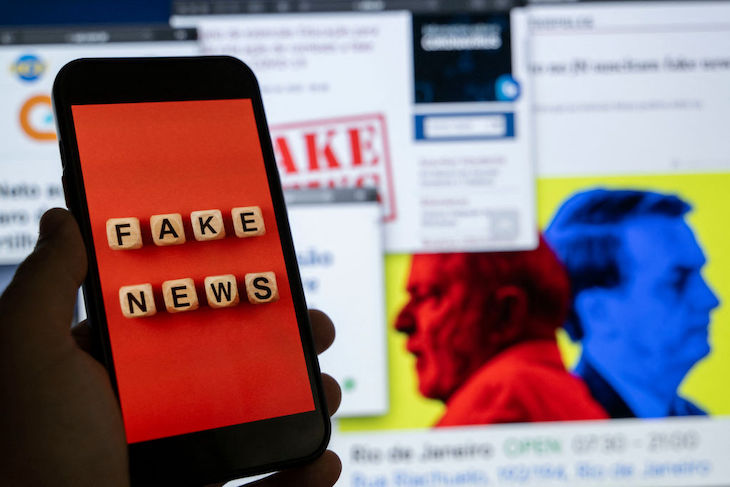For some years now, one of the greatest worries among a certain coterie has been that of ‘misinformation’. This is the idea that the masses, left to their own devices – figuratively and literally – are unable to discern what is true and what is false. This is what has prompted the establishment of such gatekeeping bodies as BBC Verify, institutions that presume to protect the general public from the vast tides of online nonsense.
Logically had ostensibly noble intentions upon its creation in 2016
The news that Britain’s biggest fact-checking company, Logically, has gone into administration, will be a blow to those who think we need such bodies. Former employees of the company blame its demise on strategic errors, although this development has happened at a time when the industry has been in retreat. Under a bullish second Donald Trump administration, the tech giants Google, Meta and X have been scaling back fact-checking on their platforms.
The company Logically had ostensibly noble intentions upon its creation in 2016. According to its founder, Lyric Jain, its goal was ‘tackling harmful and manipulative content and scale’ and ‘bringing truth to the digital world, and making it a safer place for everyone everywhere’.
The digital revolution, encompassing a decline in mainstream news consumption and reliance, has indeed resulted in an overabundance of unaccredited sources of information. But the year of Logically’s foundation is telling, and fundamental to understanding the reason why fact-checkers believe themselves to be so important.
2016 was the year of populist insurrection, of the Brexit referendum in the UK and the election that saw Trump voted US president for the first time. Both events were shocks for the elites in each country, and on both sides of the Atlantic a considerable section of the overclass reacted less than rationally or gracefully to such a display of impudence. They responded by deprecating ordinary people as ‘deplorables’, or as ‘low-information’ morons and racists easily swayed by the tabloid newspapers or whatever junk appeared on their newsfeeds. Thus was born the myth of ‘misinformation’.
In this respect, the whole philosophy of ‘fact-checking’ against ‘misinformation’ was a reflection of some benevolent desire to educate, inform and assist the general public. If it had been such an enterprise, it would have appeared at the earliest in the 1990s, with the emergence of the internet, or at the latest in the late-2000s, after the first profusion of smartphones. No, fact-checking has always been a political undertaking, and a reactionary one at that.
It was a reaction by a sour and resentful overclass that in 2016 didn’t get its own way for once. It’s been a reaction from an elite in America which failed to learn the lessons of that year, and which continued to live in aloof and insensitive oblivion until it lost once again last November.
While many in Britain have taken stock of the actual, non-imagined, non-fake reasons that have been at the root of the populist convulsions of the past decade – globalisation, deindustrialisation, immigration – there remain those who stick to the stale narrative that ordinary people are just stupid. After Reform UK’s local election gains in April, Times columnist Emma Duncan concluded that this support is ‘fuelled less by people’s experiences than by lies.’ It’s this elitist scorn, that the hoi polloi are suggestible and pliable, that has also driven the constant hounding of GB News.
Yet often it’s not the masses who need to ‘educate themselves’, but the graduate class themselves. It was the global elites and establishments who fell prey to the whole transgender cult, not your average Republican or Reform UK voter, much in the same way that generations back it was the well-educated bien pensants who became the biggest dupes of Stalin.
As Luke Conway wrote in Liberal Bullies, his book of last year, our elite obsession with the ‘misinformation’ of others betrays its own greed for power: ‘One of the defining elements of authoritarian regimes, both past and present, both right-wing and left-wing, is that they try to control information’. Indeed, it’s this controlling of information, not so much the propagation of wrong information, that causes popular unrest. It was a central factor to causing last summer’s unrest, when the authorities withheld key facts about the background of the Southport killer.
The notion of ‘misinformation’ is itself built on an error. There is no such thing as wholly objective facts or given truths when it comes to human affairs. Knowledge is always and forever a contested area and common truths are based on consensus. Fact-checkers are no-more omniscient, infallible or God-like than you or me. ‘Fake news’ is just a 21st-century way of saying people tell lies.
We no more need ‘fact-checkers’ than we do the entire concept of ‘misinformation’. What we need is more dialogue and less people presuming to know what is right for you and me.







Comments